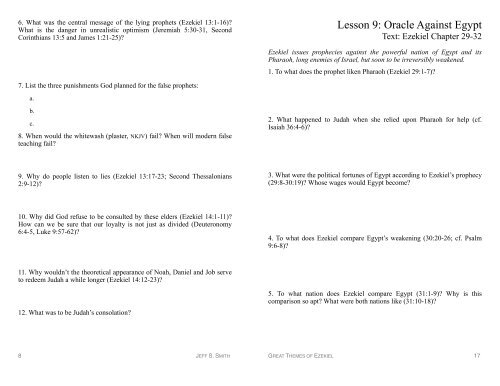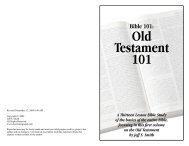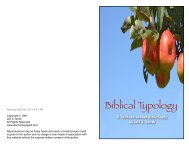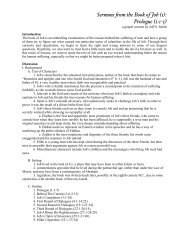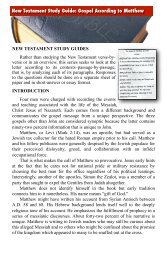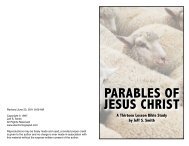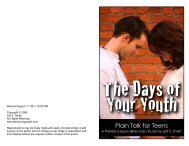6. What was the central message of the lying prophets (Ezekiel 13:1-16)?What is the danger in unrealistic optimism (Jeremiah 5:30-31, SecondCorinthians 13:5 and James 1:21-25)?They promised peace in Judah when God was really preparing to bring war,causing the people to be falsely secure and spiritually and physicallyunready for the looming crisis. We need to judge ourselves and ourprospects honestly so that we can be truly prepared.7. List the three punishments God planned for the false prophets:a. they would no longer belong to the assembly (council) of the peopleb. they would no longer be citizens of the nationc. they would have no hope of returning from their exile8. When would the whitewash (plaster, NKJV) fail? When will modern falseteaching fail?The whitewash fails when the storm of invasion appears. Error fails when itis tested, whether in study, debate or certainly in God’s judgment.9. Why do people listen to lies (Ezekiel 13:17-23; Second Thessalonians2:9-12)?People listen to lies because they cannot love a truth that costs them toomuch or challenges them spiritually to change.10. Why did God refuse to be consulted by these elders (Ezekiel 14:1-11)?How can we be sure that our loyalty is not just as divided (Deuteronomy6:4-5, Luke 9:57-62)?They had taken idols into their hearts and set stumbling blocks of iniquitybefore their own faces. Their loyalties were divided, as are ours if we areputting things ahead of God.11. Why wouldn’t the theoretical appearance of Noah, Daniel and Job serveto redeem Judah a while longer (Ezekiel 14:12-23)?Their righteousness could not be shared by all, but would only savethemselves. Men are judged as individuals, not groups.12. What was to be Judah’s consolation?They would be consoled by the sight of a living remnant, dedicated toserving God and restoring his favor among them.8! JEFF S. SMITHLesson 9: Oracle Against EgyptText: Ezekiel Chapter 29-32Ezekiel issues prophecies against the powerful nation of Egypt and itsPharaoh, long enemies of Israel, but soon to be irreversibly weakened.1. To what does the prophet liken Pharaoh (Ezekiel 29:1-7)?Ezekiel likens him to a crocodile or dragon swimming around in the Nile,which he considered to be his river and creation.2. What happened to Judah when she relied upon Pharaoh for help (cf.Isaiah 36:4-6)?Egypt snapped like a staff made of reed and injured Judah in the processbecause God wanted to be her staff but she was not willing.3. What were the political fortunes of Egypt according to Ezekiel’s prophecy(29:8-30:19)? Whose wages would Egypt become?Egypt would decline in influence and power, although a remnant wouldensure that the nation continued to exist, but without her former glory,forfeited by pride to Nebuchadnezzar.4. To what does Ezekiel compare Egypt’s weakening (30:20-26; cf. Psalm9:6-8)?Ezekiel compares it to a broken arm, with the promise of a matching set intime.5. To what nation does Ezekiel compare Egypt (31:1-9)? Why is thiscomparison so apt? What were both nations like (31:10-18)?Ezekiel compares Egypt to Assyria, the nation that conquered Israel, butherself soon suffered destruction from the Babylonians as a result. Bothnations had been like majestic trees, but then cut down to size when theyoutgrew their usefulness.<strong>GREAT</strong> <strong>THEMES</strong> <strong>OF</strong> <strong>EZEKIEL</strong>! 17
8. What was Tyre’s strength (Ezekiel 26:1-21)?Tyre was the great seaport of Phoenicia and a commercial center nearIsrael’s northern border. Judah had been a trade link between Tyre andArabia, but with her out of the way, Tyre could enrich herself further.9. What was her downfall?Once an impregnable islet, Tyre would fall just as she had watched Judahfall to Nebuchadnezzar, and would never be rebuilt.10. Describe the similarities between the prophesied falls of Tyre and of“Babylon the Great” in Revelation 18.Both were merchant cities that helped others become wealthy, but whowould be destroyed by God for their immorality and persecution of hispeople.11. What comprised the perfect beauty of Tyre (Ezekiel 27:1-11)?Tyre’s perfect beauty was in its wealth, infrastructure and military alliances.It was the essence of her pride, soon to be reduced to rubble.12. To what does the prophet liken Tyre’s demise (Ezekiel 27:12-36; seeespecially verses 25-27)? Which of the seven churches of Asia Minor heldsimilar views about itself (Revelation 2-3)?Tyre was overloaded with pride and wealth and would sink because of theburden. The church in Laodicea was similarly proud of its riches, wealth,independence and influence, but Christ straightened them out.13. What was the sin of the prince of Tyre (Ezekiel 28:1-10)? How do greatriches inflate a man’s pride and self-estimation today?He elevated himself to the level of deity and his heart was lifted up becauseof his great riches. Rich people today can become just as proud and viewthemselves as gods in business or government or entertainment, until theyare humbled and brought low.14. What is described in this lamentation (Ezekiel 28:11-19)?The downfall of the proud king of Tyre is described here and there is noevidence that the passage describes the fate of the devil, but rather usesallegory to mark out the king’s sin.15. What is the last of six nations to be punished according to this section ofScripture (Ezekiel 28:20-26)? What would become of the Jews afterward?After Sidon and the others would be punished, God would restore arefreshed Israel to rebuild her homeland and to wait for the Messiah.16! JEFF S. SMITHLesson 5: Metaphor, Allegory, ParableText: Ezekiel Chapters 15-17Judah is compared to a wild, uncultivated vine and an adulterous,ungrateful bride before being confronted with a parable of two eagles.1. God, perhaps shockingly, compares Judah, not to the cultivated vine ofthe vineyard as elsewhere in the Old Testament, but to the wild vine of theforest (Ezekiel 15:1-8). What is the implication? Why was God judging andburning this devolved vine?God was deflating the pride of the Jews by comparing them unfavorablywith the heathen whom they scorned. Judah was guilty of unfaithfulness.2. To what does James compare unfaithfulness to God (James 4:1-5)?James compares spiritual unfaithfulness to marital infidelity.3. What point did Paul make when returning to this theme of wild andcultivated vines (Romans 11:11-25)?Paul was addressing the Roman Christians, who as Gentiles were graftedinto the cultivated Jewish vine, but cautioned against pride that would causethem likewise to be cut out and burned just the same.4. What was Judah’s moral genealogy (Ezekiel 16:1-5)? What transitiondoes he describe in Judah (6-14)?God says Judah was fathered by the Amorite and mothered by the Hittite,indicating that she was no better morally than the heathen she displacedfrom the land of Canaan. God took her in as a foundling child until she grewup and became his bride.5. What made Judah beautiful? Where is the glory of the church–in ornatearchitecture, pious rituals, societal approval or elsewhere? Where (Ephesians3:21, 5:27)?Judah was beautiful because God bestowed splendor upon her, as he doesthe church through his presence.<strong>GREAT</strong> <strong>THEMES</strong> <strong>OF</strong> <strong>EZEKIEL</strong>! 9


